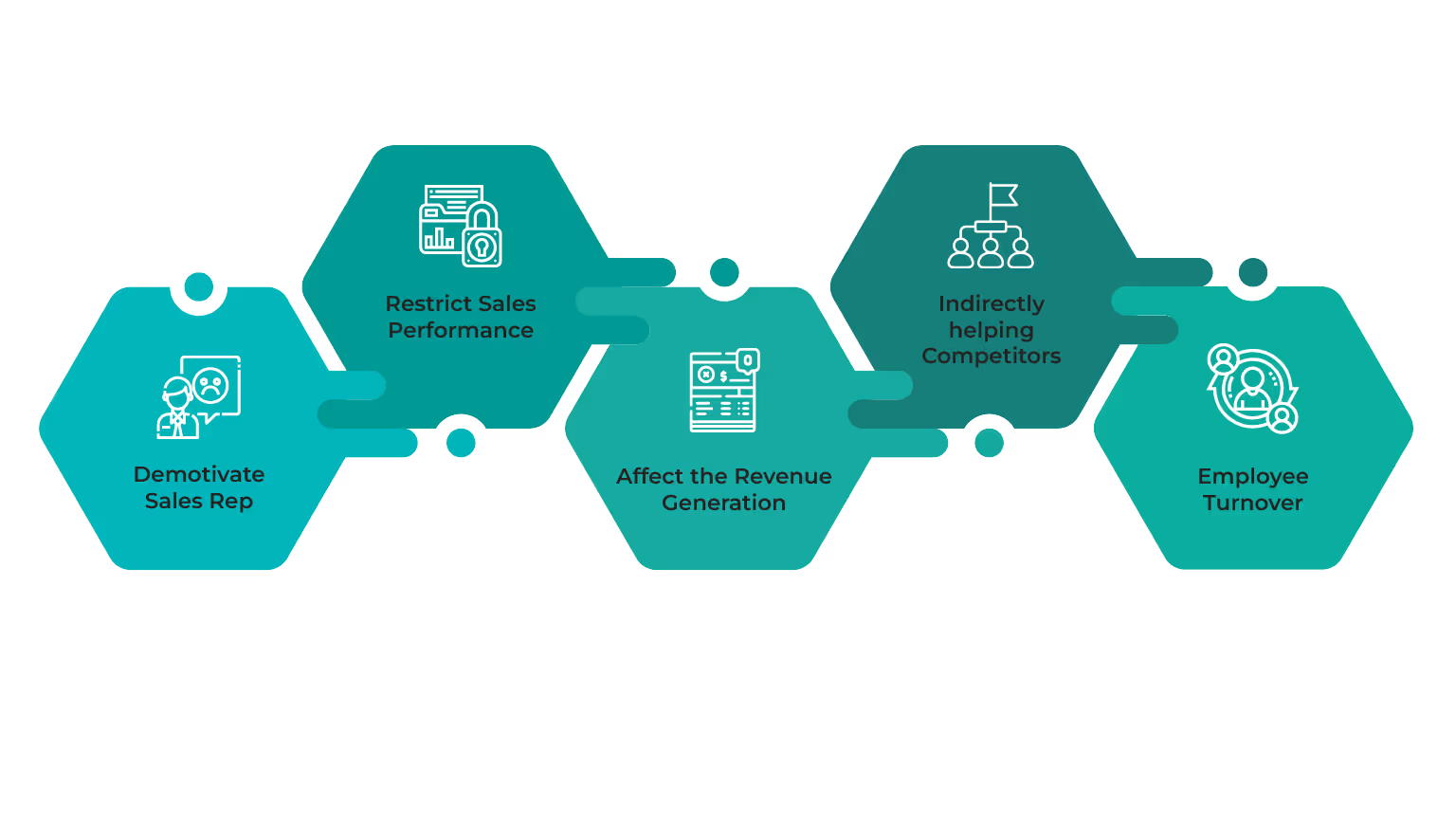
Blog
Why Implementing a Commission Cap Can Backfire You?
August 2, 2023


Key Insights
In a study conducted by Gallup, it was found that nearly 80% of employees worldwide are still not engaged or are actively disengaged at work.
Employee engagement is critical to the growth and success of an organization. A happy and satisfied workforce will ensure higher productivity and strive to achieve the company's objectives.
Especially in a sales environment, where salesforce performance has a direct impact on the organization's growth, ensuring employee engagement is a priority.
In addition, individual incentive plans have proven to be particularly effective in recognizing and rewarding top-performing sales representatives, fostering healthy competition within the team, and maximizing overall productivity.
But what will happen to the salesforce when you cap their commission?
In this article we will delve into the topic of commission caps, why organizations incorporate it, and how it can backfire.
Scroll down for more information!
What is Commission Cap
Commission caps refer to the limit that companies place on the amount of incentive a sales rep can earn. Upon reaching that limit, sales reps stop earning any more commission for any sales they bring in that quarter or year.

For example, a company offers a 5% commission for each sale a rep brings. They have also set the commission cap at $20,000 beyond which the sales reps earn no commission.
Imagine a sales rep has brought in $50,000 worth of sales in a quarter. By incentive calculation, they must earn
5%(50,000)= 25,000
But they will earn only $20,000 since the commission cap is set in their incentive program.
Now,this format of commission cap calculation is seen with mixed opinions from the organizational and employee perspective. Let's delve deeper to understand these opposing points.
You can further refer to Crafting a Winning Compensation Strategy for Maximizing Success to understand more about other compensation strategies.
Why Companies Cap the Commission
From an organizational standpoint, commission caps offer great benefits to them. The main reason is revenue.
Salespeople will close deals of varying amounts. Some will be bigger than others.
In this delicate balance, meticulous sales commission accounting plays a pivotal role in ensuring that incentive compensation remains a motivational force without overly burdening the organization's financial structure. Proper accounting practices enable businesses to accurately track commission payouts, analyze their impact on overall profitability, and strategize commission structures that reward performance while safeguarding the organization's bottom line. Utilizing relevant sales acronyms in this process can further enhance clarity and efficiency.
This usually happens when huge deals are closed. A 5% of a million-dollar sale is a huge amount of money that the organization will have to share with their sales reps. Such a commission will obviously be seen as an overpayment from the managerial viewpoint.
In one way, organizations are right in their opinion. Business is a risky job where none knows what will happen the next moment. So reserving whatever they can for future growth as well as to face the unprecedented is justified.
But, on a larger picture, the negative impact a commission cap can bring to business operations is more than any other future unpredictable challenges will incur. However, aligning commission structures with annual sales goals can help mitigate potential drawbacks and ensure that incentives remain aligned with business objectives.

So what are the effects that a commission cap policy will cause on your organizational management? Let's understand more.
Disadvantages of Commission Caps on Employee
Commission cap is often seen as an unwise practice to incorporate into business operations. So here is why the commission cap has a bad reputation in incentive compensation management.

- Demotivate Sales Reps
The primary purpose of a sales commission is to motivate the sales team and drive them to attain their quotas. From the beginning of the quarter, most sales reps will proactively chart out the number of deals they must close and calculate the incentives they will earn. Hence, capping their commission is like putting out their flame to strive hard. Implementing an effective sales compensation strategy is crucial to maintain their motivation and encourage peak performance.
- Restricts Sales Performance
Incentive compensation management has a huge impact on the way sales reps perceive their job, strategize their plans, and close deals timely. It is the biggest fuel for their sales performance and drives them toward their on target earnings. Capping commission will thus limit their potential and discourage their drive.
- Effect the Revenue Generation
Sales reps are the ones who ensure consistent revenue growth for the company. If a commission limit is set on the incentive they earn in a quarter, then it is natural that they might push a deal to the next quarter so that they can be eligible for the commission. This practice can have a negative impact on the organization.
- Indirectly Helping Competitors
The focus with which a sales team works will lead the organization to growth and success. So, if they are not driven to close the deals it means that you are losing your prospective clients to competitors. This can have a negative effect not just for the quarter but can impact the longer run.
- Employee Turnover
The most powerful aspect of incentives is employee satisfaction and engagement. An employee who is happy in your work environment will be self-driven to achieve more. Setting commission caps will make the salesforce fulfill their required quota, discourage them to take an extra set, and eventually lead to losing your best talent to competitors.
These examples show that more than the momentary revenue gain, the financial loss sales cap will cause is longer and more impactful.
To better plan your incentive compensation program here are 10 Effective Incentives to Boost Employee Motivation and Productivity
Conclusion
Does this mean an uncapped commission is the final solution?
Not necessarily!
Building a good incentive program requires an in-depth understanding of your organization, its operations, employees as well as the brand you are building.
It requires great thought in choosing what suits your structure and eliminating the not desirable ones. Surely, a commission cap policy is one such practice that can affect your organization and employees in the long run.
Incentive compensation management requires judicious choices from the organization to bring in the desired results.
In the current scenario, an inevitable part of sales commissions is automation. It has gone past from being a choice to a necessity to ease your everyday tasks and streamline your operations.
Kennect runs your sales compensation programs in cruise mode to create transparency and achieve operational efficiency. For more information BOOK A Demo Now!
ReKennect : Stay ahead of the curve!
Subscribe to our bi-weekly newsletter packed with latest trends and insights on incentives.
Thank you! Your submission has been received!
Oops! Something went wrong while submitting the form.
Your data is in safe hands. Check out our Privacy policy for more info






.avif)








